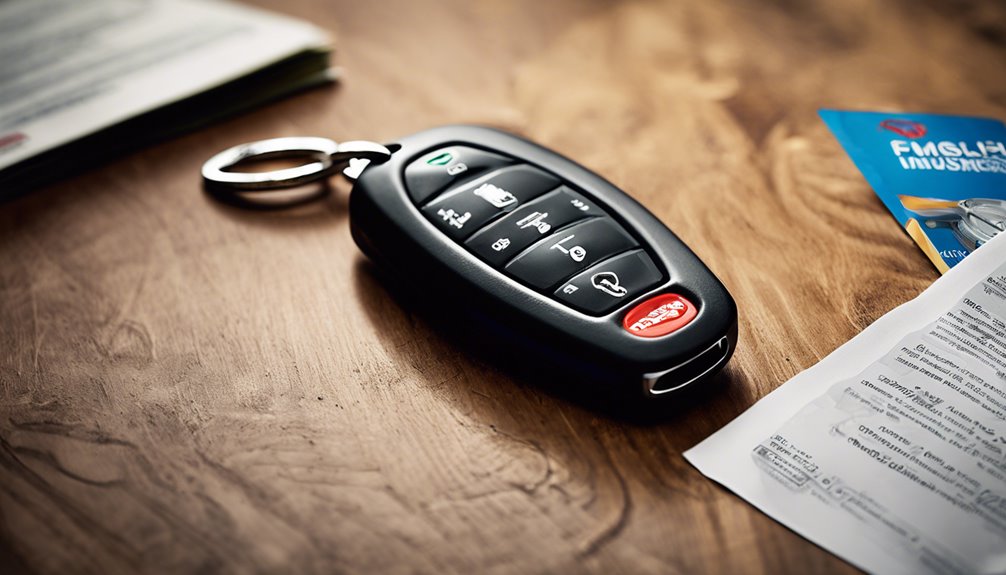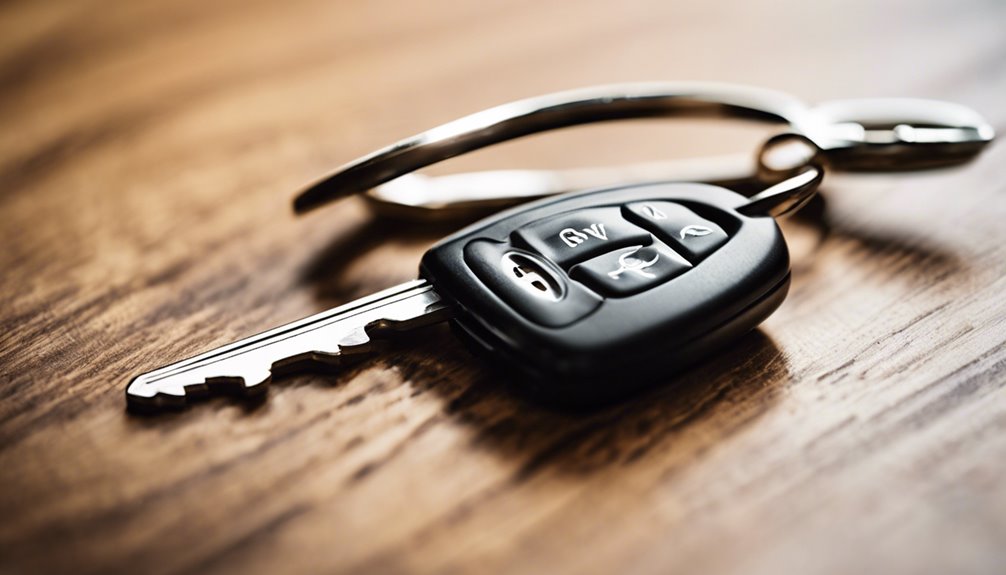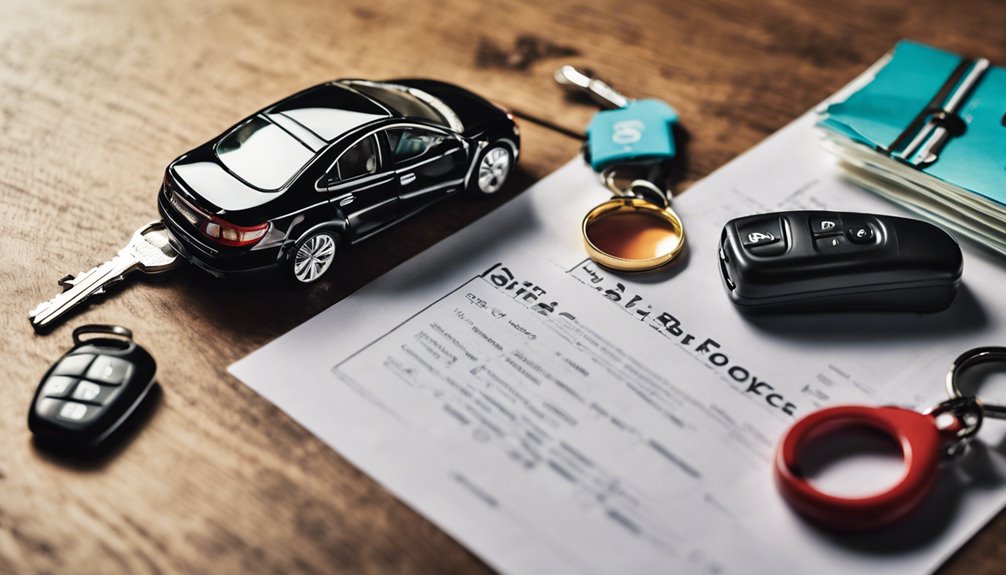To save on car key replacement costs, utilize key replacement warranty plans, covering up to $799 for high-end models, which often include mobile service and flexible terms. Most car insurance policies won't cover lost keys, but home insurance might under personal property clauses. Alternatively, consider keycare insurance to cover locksmith and fob costs. Analyzing service provider pricing and hidden fees is vital for cost efficiency. Extended warranties also offer additional coverage such as roadside assistance. Choose third-party services with verified credentials to potentially lower costs compared to dealerships. Explore these avenues for a deeper understanding of potential savings.
Key Takeaways
- Key replacement warranty plans cover costs up to $799 for high-end models, offering significant savings on replacement expenses.
- Home or renters insurance may cover key replacement under personal property clauses, reducing out-of-pocket costs.
- Comparing insurance deductibles against replacement costs helps determine the most cost-effective solution for lost keys.
- Extended warranties can include roadside assistance and next-day key creation, minimizing additional expenses.
- Evaluating third-party services can yield lower prices and avoid dealership markup on key replacements.
Key Replacement Warranty Plans

When considering Key Replacement Warranty Plans, it's essential to understand the extensive coverage they offer. These plans often cover replacement costs up to $399 for domestic vehicles and $799 for high-end models. You'll appreciate the thorough protection they provide, covering lost, stolen, or damaged keys, including key fobs and transponder keys. However, exotic vehicles, grey market vehicles, trailers, RVs, motorcycles, watercraft, and commercial vehicles are generally excluded, so it's important to verify your vehicle's eligibility. The added convenience of a 24-hour mobile service ensures that you can receive assistance at any time, enhancing the overall value of these plans. Service perks enhance the value, offering 24-hour roadside assistance, next-day key creation, and rental services. Imagine the peace of mind knowing you have access to towing, lockout services, and even emergency message relay when you're in a bind. The term flexibility is another advantage, with plan durations ranging from one to seven years, allowing you to tailor the coverage to your needs. Contracts are detailed, outlining clear terms and conditions, exclusions, and limitations. Cancellation policies are clearly defined, often including free look periods and pro-rated refunds. Plans are administered by various companies, complying with state regulations, ensuring you're in capable hands. Whether through Continental Warranty, CarEdge, or others, these plans offer significant benefits.
Insurance Options for Lost Keys

Managing insurance options for lost keys requires understanding the limitations of standard policies. Typically, standard car insurance doesn't cover lost or stolen keys as they're considered personal property. These policies focus more on accidents and collisions. However, if your keys are stolen during a car theft, extensive insurance might offer some assistance. It's essential to explore whether your home or renters insurance provides any coverage under personal property clauses.
For more tailored protection, consider add-ons such as key replacement insurance or keycare cover. These options often include locksmith charges, key fob costs, and door key replacements. Some providers offer specialized emergency service plans with roadside assistance, though they may not cover new key creation costs. In situations where a locksmith can't help, these plans might include towing services to a dealership or repair shop. To ensure reliable and professional assistance, consider using a service like Low Rate Locksmith, which provides certified and licensed locksmiths available 24/7.
Before filing a claim for lost keys, analyze the costs against your deductibles. Since replacement expenses often fall below deductibles, claims might not be worthwhile. Additionally, claims could potentially increase premiums at renewal. For high-tech smart keys, which are expensive, evaluate if claiming is beneficial. Proactively, keeping spare keys or using tracking devices can help mitigate losses.
Key Types and Costs

Understanding different car key types and their associated costs is essential for making informed decisions when you need replacements. Each key type involves distinct expenses and considerations, so knowing these can keep your budget in check and avoid surprises.
Standard car keys, often the simplest and least expensive, range from $18 to $180. They don't require programming, so copying them at a local hardware store can be the most economical option, typically costing between $50 to $160.
Transponder keys are more complex. They range from $100 to $350 due to their programming needs for vehicle recognition. The usual cost is around $220 to $250, and you might incur additional expenses for a locksmith visit or towing.
Smart keys, known for their advanced security features, have costs ranging from $200 to $513. Their price varies considerably depending on your vehicle's make and model, with luxury brands demanding the highest fees.
Finally, car key FOBs, which combine keyless entry and ignition, range from $100 to $650. You can expect to pay $100 to $300 for the FOB itself, with potential extra charges for programming and locksmith services.
Consider the following when determining key replacement costs:
- Key Type: Standard, Transponder, Smart, or FOB.
- Programming Needs: Required for Transponder, Smart, and FOB.
- Additional Services: Locksmith visits or towing.
To minimize costs, it is beneficial to utilize mobile locksmith services 24/7 that can quickly assist with key replacement without the need for towing.
Extended Warranty Benefits

Delving into extended warranty benefits for car key replacement offers an essential layer of financial protection that can greatly ease the burden of unexpected expenses. With Continental Warranty, you can receive up to $399 annually for domestic vehicles or up to $799 for higher-end models. Toyota Financial Services provides up to $800 per occurrence—an attractive option if you're driving a model that qualifies. AGWS Compass further diversifies your options with Plan 1 covering up to $400 annually, while Plan 2 extends to $800.
Beyond cost coverage, additional benefits sweeten the deal. Continental Warranty grants 24-hour roadside assistance, next-day key creation, and up to $100 in towing coverage. Toyota Financial Services adds vehicle lock-out assistance, substitute transportation reimbursement, and emergency message relay services. These conveniences transform a stressful situation into a manageable one.
Eligibility and limitations require close attention. AGWS Compass offers no mileage constraints, though Toyota Financial Services may exclude certain vehicles or aftermarket keys. Prior authorization is often essential under Toyota's plan. Understanding these specifics guarantees you're making an informed choice tailored to your vehicle's needs, maximizing the financial and practical benefits of extended warranties. For unexpected lockouts, the emergency lockout assistance provided by locksmith services ensures quick and reliable solutions without causing damage to your vehicle.
Third-Party Replacement Services

While extended warranties provide a robust financial safety net for unexpected key replacement costs, third-party replacement services offer a viable alternative with their own unique advantages. Companies like Car Keys Express deliver discounted on-site solutions, often reducing the financial burden compared to dealership fees. Here's what makes third-party services appealing:
- Cost Efficiency: Their pricing structure is generally lower, allowing you to save money without sacrificing quality.
- Convenience and Speed: On-site key replacement and expedited services minimize downtime, guaranteeing you're back on the road swiftly.
- Diverse Options: They provide a wide range of key types, remotes, and accessories, accommodating various car models and preferences.
In addition to these benefits, automated machines for laser key cutting ensure precision and reliability, which is crucial for maintaining the integrity and security of your vehicle's locking system. However, as with any service, due diligence is essential. Verify that the service uses high-quality materials and programming methods. Pay attention to reviews and ratings for insights into reliability, especially concerning security and compatibility with your vehicle's specific key type. Warranty offerings can vary, so confirm any replaced key comes with coverage. Finally, check for regulatory compliance to avoid potential legal issues. By considering these factors, you can confidently choose a third-party service that meets your needs and expectations.
Frequently Asked Questions
How Long Does the Key Replacement Process Usually Take?
When you need a key replacement, expect a locksmith to complete it in 20 to 30 minutes. They're efficient, with key cutting taking around 10 minutes and programming varying by vehicle complexity. Dealerships, however, might take a few hours to days due to procedural checks and parts availability. Your vehicle's make and model, key type, and service location greatly influence the timeframe. Choosing the right service can save you time and hassle.
Can I Transfer a Key Replacement Warranty to a New Vehicle?
Oh, you're hoping to transfer that key replacement warranty to your shiny new vehicle? Of course, because who wouldn't want to cling to a lifeline in this world of lost keys and broken dreams? Sadly, most key replacement warranties are vehicle-specific. They don't transfer to your new ride. However, check the fine print or call your provider. Some might surprise you with transfer options, but prepare for fees and conditions.
Are There Any Discounts for Multiple Key Replacements?
When you're seeking discounts for multiple key replacements, check with locksmiths, as they might offer deals when you need several keys made at once. Dealerships typically don't provide such discounts due to individual key programming requirements. Consider specialized companies like Car Keys Express for savings. Key complexity and vehicle type affect costs, so evaluate these factors. Purchasing extra keys during initial replacement can also lead to cost-efficiency over time.
What Happens if the Replacement Key Is Defective?
If your replacement key is defective, it can compromise your vehicle's security and functionality. Low-quality keys might be easily duplicated, leading to potential theft. You'll experience malfunctions, such as ignition issues or immobilizer failures, which could damage your vehicle. These defects can result in expensive repairs and frequent replacements, becoming a financial burden. To avoid these problems, always choose reputable service providers for high-quality, professionally programmed keys.
Is There a Waiting Period Before the Key Replacement Coverage Starts?
You might worry about waiting periods, but they actually streamline your key replacement process. Typically, there's a 30-day waiting period after you sign up for a protection plan. This time allows for necessary vehicle checks and guarantees your plan is tailored to your car's condition and mileage. Skipping this would require costly inspections. So, while waiting might seem inconvenient, it ultimately helps keep your costs low and your coverage effective.
Conclusion
Coincidentally, you're at a crossroads where understanding key replacement options saves money. By choosing a thorough warranty plan or leveraging insurance, you reduce unexpected costs. Knowing the types and costs of keys guarantees you're well-prepared. An extended warranty might be your best ally, while third-party services offer competitive alternatives. Analyzing these options equips you to make informed decisions, making sure that when you lose a key, it doesn't break the bank.
